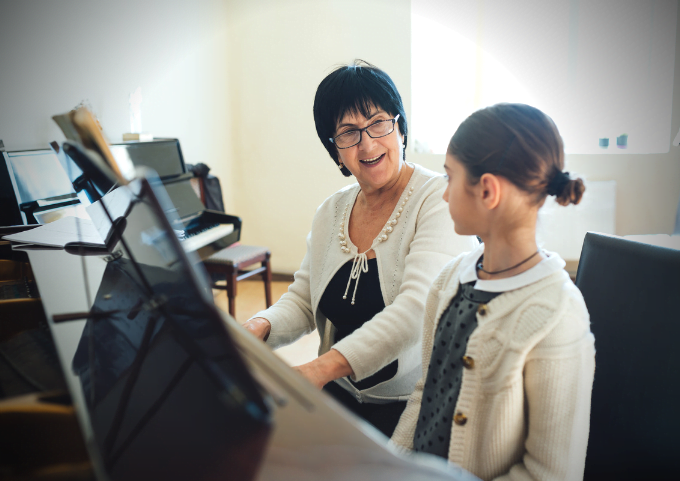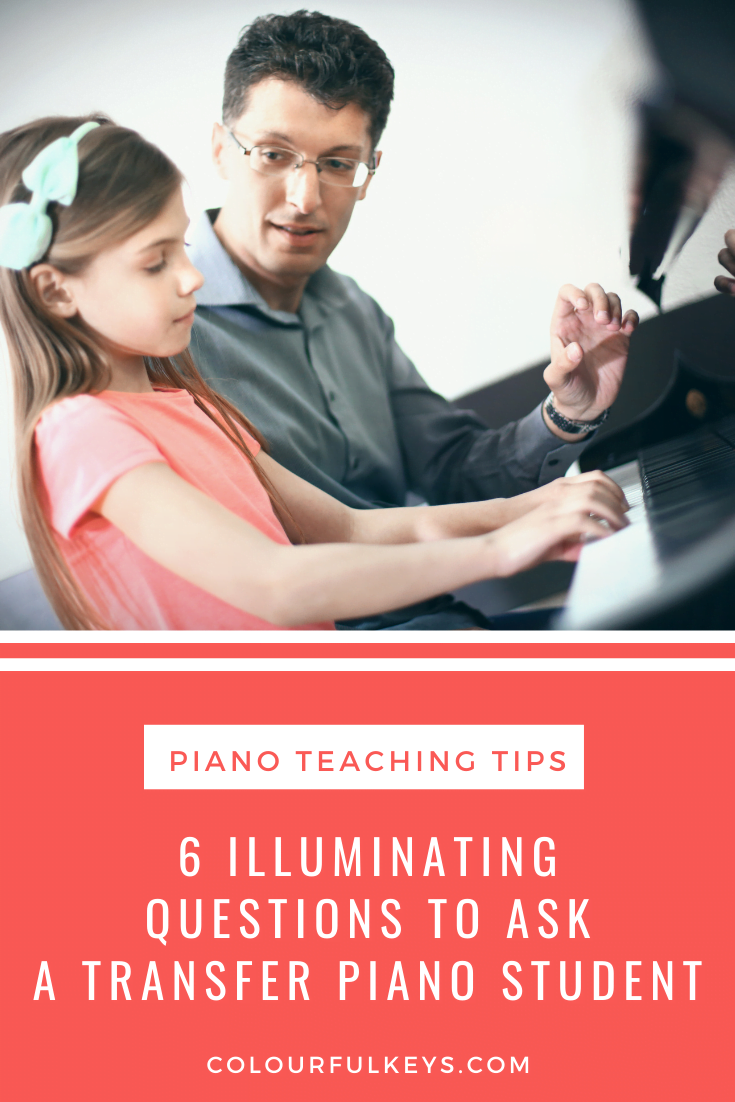
This article about what questions to ask a transfer piano student was written by guest contributor Chrissy Ricker. Chrissy is a piano teacher, composer, and arranger from North Carolina. She enjoys sharing her ideas with other piano teachers and creating music to engage, educate, and excite piano students of all ages. When she’s not at the piano, you’ll probably find Chrissy reading a good science fiction novel or spending time with her husband, Joel, their dog, and three cats. You can learn more about Chrissy on her website.

Chances are you’ve encountered your fair share of transfer students over the course of your teaching career. While working with any new student presents a unique set of challenges, working with transfer students can be especially tricky.
Often these students come into our studio with strong likes, dislikes, and expectations on how lessons should go based on their previous piano experiences. Sometimes they have technical issues which require extra attention.
At the same time, we also need to be mindful that these students will be adjusting to working with a new teacher – one who may have a completely different teaching style from their previous one.
The First Meeting with Potential Transfer Piano Students
When I meet a new transfer student for the first time, I have a few goals:
- Establish a rapport and put them at ease.
- Get an idea of what they have already learned and develop a plan for how I might work with him or her moving forward.
- Demonstrate my teaching style and determine if my studio will be a good fit for this student.
The first interaction with a potential transfer student is truly a time for us to get to know one another at the piano. We also need to be able to assess quickly what they’ve already learned and identify any possible gaps.
Asking the right questions is key.
What to Ask Potential Transfer Music Students
To that end, here are the 6 questions I’ve found to be the most helpful when getting to know a new transfer music student.
Transfer Student Question 1: Can I see your most recent assignment book?
I always ask transfer students to bring the materials they were using with their previous teacher. Their most recent assignment book can be a treasure trove of information!

Often, I find that students have trouble verbalising the concepts they worked on with a previous teacher. Maybe some time has passed since their last lesson, and they don’t remember if a certain topic was covered. Or maybe the previous teacher used different terminology to explain that concept.
The assignment book lets me see, in that teacher’s own words, which concepts the student may have already encountered.
It’s also helpful for me to get an idea of the pacing a student may be accustomed to. For example:
- Did they learn one new piece a week, or five?
- Were there any instructions about technique, rhythm, or practice habits noted frequently which might indicate problem areas for this student?
- What expectations did the previous teacher have for practicing?
- What theory, ear training or creative activities did the previous teacher assign?
Any information which I can glean from a student’s previous assignments will helpful in determining a path going forward.
(Hopefully it goes without saying, I always keep my comments positive and professional about any assignments or materials from previous teachers.)
Transfer Student Question 2: Can you play your favorite piece for me?
Inviting new transfer students to play their favourite piece can be very helpful.
Even if the performance is a bit rusty, hearing a student’s favourite piece gives me a good idea of his or her musical tastes. This helps me brainstorm a few pieces in a similar style which they might enjoy working on in the future.
I also get an idea of their playing level and with a sneak peek at any technique issues they might need to work on.
In our first interaction, I try to limit my comments to one positive comment (“you played that piece with such a nice steady beat!”) and one constructive comment (“do you think you could make this section even lighter and bouncier, like this?”).
I don’t want to overwhelm students with suggestions. I do think it’s helpful, though, to give students an idea of how I offer feedback during a typical lesson.
Transfer Student Question 3: Can you sight read this piece for me?
I like to have a few sight reading options on hand when working with potential transfer students for the first time.

Bear in mind that a student’s reading skills may be a bit rusty, especially if some time has passed since their last lesson. However, getting a general idea of their current reading level (which may differ significantly from their playing level) is very helpful.
Going through the process of sight reading a new piece is also a great opportunity to ask transfer music students a few questions to assess their music theory knowledge, music vocabulary and listening skills. For example:
- What is the key signature/time signature/tempo marking of this piece?
- What musical symbol do you see in measure 5?
- What chord do you see in the left hand at measure 15?
- Can you clap this rhythm back to me? Where do you see that rhythm in the music?
- Listen to me sing a measure of the melody. Can you sing it back to me and find it in the music?
I reassure students that it’s totally fine if they don’t know the answer to every question. I just want an idea of which concepts and terms might be new to them, and which just need a bit of a refresher.
Transfer Student Question 4: What are your goals for piano lessons?
While I ask every new student about their goals for piano lessons, I think it’s especially important for transfer students.
Transfer piano students often have enough musical experience to know what they like – and don’t like! – about piano.
Does this student hope to play advanced classical music and participate in competitions one day? Do they want to be able to play their favorite pop songs by ear or write their own music? Maybe, they hope to accompany their church choir sometime in the near future.
These are all admirable goals, and each would require incorporating a different set of skills into our lessons.
Knowing the specific goals students have for lessons also helps me determine if my studio would be a good fit for them or if it might be better to refer them to another teacher who can offer opportunities I can’t.
What if a student doesn’t have any goals for piano lessons yet? Well, that is helpful information to know too!
In those cases, we’ll plan on working together with a well-rounded curriculum which gives students a chance to experience a wide variety of musical styles as well as different musicianship skills.
Transfer Student Question 5: What do you like to do other than playing the piano?
This question can be an enlightening one for a couple of reasons.
First, it’s a way to assess their overall commitment level to lessons and what their typical week might look like. If they also play the flute, are on the soccer team and take dance lessons, that’s probably an indication that we’ll need to discuss how piano practice will fit into their daily routine.

Getting to know a student’s outside interests also helps me make a personal connection with them and gives me ideas on how to engage and motivate him or her moving forward.
Does the student enjoy playing video games? A video game-like app might be just the ticket for reviewing those note names which seemed a bit rusty. Does the student love animals? An animal-themed supplemental book might be the perfect way to solidify this student’s reading skills. Is the student a sports fan? Using sports analogies to explain technical concepts might be really helpful!
Transfer Student Question 6: Do you have any questions for me about piano lessons?
I end every initial interaction – whether with a brand-new beginner or with a transfer student – by asking students if they have any questions for me about piano lessons.
While I find that parents often ask practical questions (“When is tuition due?” or “What do we need to bring to our next lesson?”), a transfer piano student often asks questions like “How long have you played the piano?” or “Who is your favorite composer?”
I love answering these kinds of questions because it helps me to connect with students, one musician to another! I enjoy talking with students about my own musical experiences and musical tastes.
Above all, by asking this question I hope to show students that I value their input and that I want them to be an active participant in our lessons together.
While I might have lots of questions on my transfer student checklist, I also want students to know that I am listening – and that I think their questions are an equally important part of the learning process as we work together in the next stage of their musical journey.
If you want more helpful tips, tricks and resources about planning music lessons, you’ll love the content on Nicola’s Planning Piano Lessons hub page.
